11 Common African Grey Parrot Sick Symptoms
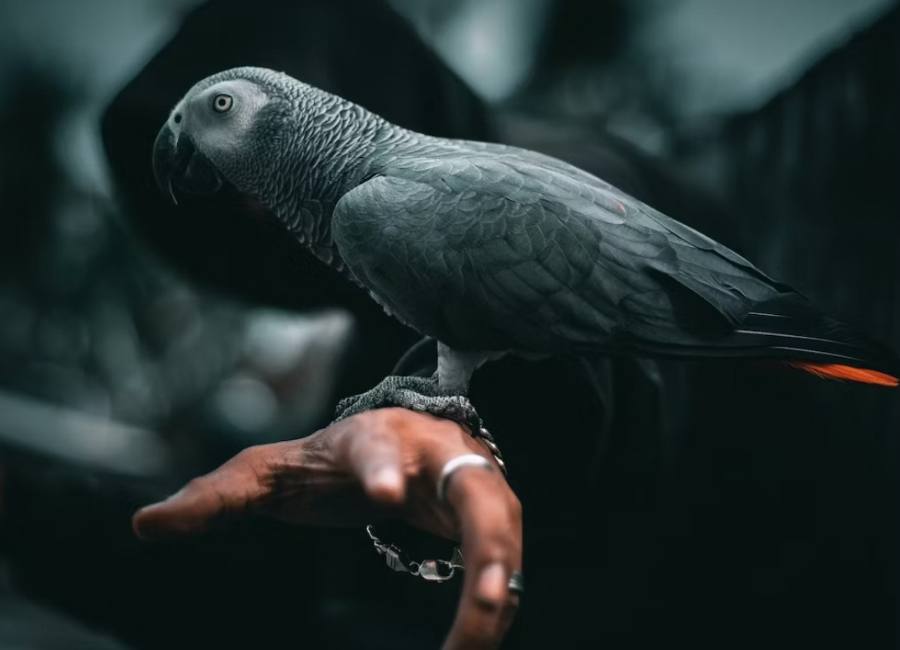
Have you ever noticed changes in your African Grey Parrot’s behavior or health?
As pet parents, it’s crucial to be aware of any potential sick symptoms that your feathery friend may display.
In this blog post, we’ll explore some common African Grey Parrot sick symptoms to keep an eye out for, and what actions you can take to ensure your parrot stays healthy and happy.
So, let’s get started!
African Grey Parrot Sick Symptoms
Signs of illness in African Grey parrots may include lethargy, loss of appetite, respiratory distress, diarrhea, vomiting, or changes in the appearance of their droppings.
These symptoms can indicate a wide range of illnesses and should be immediately brought to the attention of an avian veterinarian.
Regular check-ups and preventative care can also help prevent illness in your parrot.
Let’s break it down…
The following are some of the most common African grey parrot sick symptoms:
1. Swollen Eyes or Feet
Swelling in your parrot’s eyes or feet could indicate an accident, infection, or nutritional insufficiency.
Examine their living environment for potential hazards like sharp objects or rough perches that could cause damage.
Ensure that they get a well-balanced diet that fits their nutritional requirements.
If the swelling persists or worsens, seek the advice of an avian veterinarian to determine the reason and provide appropriate therapy.
They might advise pain relievers, topical ointments, or adjustments to the parrot’s surroundings or nutrition.
2. Feather Plucking
The plucking of feathers is a typical symptom in African Grey Parrots. It happens when a parrot takes out its feathers excessively, resulting in bald patches or damaged plumage.
Feather plucking can result from a variety of factors, including stress, boredom, starvation, or medical issues like mites or allergies.
To remedy this issue, provide cerebral stimulation for your parrot through toys and puzzles.
Make sure they eat a well-balanced diet of fresh fruits and vegetables, pellets, and seeds.
It is critical to speak with an avian veterinarian to rule out any underlying health issues and, if necessary, obtain proper treatment.
3. Coughing or Wheezing
Coughing or wheezing sounds in African Grey Parrots can be concerning and may signal a respiratory problem.
Isolate the infected bird from other birds to prevent infection from spreading.
Use a vaporizer or spritz the area with warm water to provide warmth and humidity.
It’s critical to get in touch with a certified avian veterinarian as soon as possible for a diagnosis and treatment choices.
4. Sneezing and Nasal Discharge
In African Grey Parrots, sneezing and nasal discharge are signs of a respiratory infection or an allergic reaction.
Make sure the cage is clean and well-ventilated, and remove any sources of dust or potential irritants.
Avoid cigarette smoke, strong scents, and household cleaning agents.
If the symptoms persist or worsen, it is critical to get medical attention from an avian veterinarian.
They may suggest diagnostic testing and treatment options such as antibiotics or antihistamines.
5. Runny Noses and Eyes
A runny nose or watery eyes in your African Grey Parrot could indicate an upper respiratory infection or allergies.
Keep their living environment clean and free of irritants such as dust and dander.
Avoid using scented candles, air fresheners, or any other strongly scented things in the vicinity.
Consult a veterinarian to determine the root cause and obtain appropriate treatment.
To relieve the symptoms, they may offer nasal flushes, eye drops, or medication.
6. Lethargy and Weakness
It could be an indication of disease if your African Grey Parrot appears especially lethargic or feeble.
Check the bird’s body temperature with an appropriate thermometer; deviations from the normal range may signal a problem.
Make sure the perches, temperature, and lighting are all acceptable.
Maintain a healthy diet and promote mental stimulation through toys and social interaction.
If the symptoms persist, it is critical to seek veterinary care as soon as possible to identify and treat the underlying problem.
7. Diarrhea
Diarrhea in African Grey Parrots can indicate a variety of health problems, such as infections, nutritional imbalances, or stress.
Check the bird’s droppings on a regular basis for any changes in consistency or color.
Consult a veterinarian if diarrhea lasts more than a day or is accompanied by other symptoms such as lethargy or loss of appetite.
The vet may do tests to determine the cause and propose a treatment plan, which may include dietary changes, probiotics, or pharmaceuticals.
8. Loss of Appetite
Loss of appetite in African Grey Parrots can be a concerning symptom, indicating disease or suffering.
Begin by scanning your surroundings for potential stressors such as noise, new pets, or changes in routine.
Make sure the bird has new food and water every day, and consider feeding a variety of textures and flavors to whet its appetite.
If the loss of appetite persists, consult an avian veterinarian to determine the reason and suitable therapy.
9. Changes in Vocalization
The African Grey Parrots are well-known for their incredible mimicking and vocalization abilities.
If your parrot’s voice patterns abruptly change, such as silence, less chatting, or different tones, this could be a warning flag.
Keep an eye on them to see if they have any additional symptoms. Vocalization changes could suggest physical discomfort, psychological stress, or even an underlying medical issue.
Consult an avian veterinarian to evaluate your parrot’s health and identify the source of the vocalization changes.
Based on their examination, the veterinarian may propose behavior modification approaches, environmental changes, or medical interventions.
10. Beak or Nail Abnormalities
Malnutrition, infections, or trauma can cause abnormalities in the beak or nails of African Grey Parrots.
Make sure your parrot gets a well-balanced food that includes important elements like calcium and vitamin D.
Inspect the beak and nails on a regular basis for any irregularities, such as overgrowth, cracks, or discolouration.
Seek veterinarian help if you notice any problems, as they can cause discomfort and lead to severe complications.
11. Behavioral Changes
Unexpected behavioral changes, such as hostility, sudden fear, or repeated motions, should not be ignored.
These changes may indicate physical or psychological problems in your African Grey Parrot.
Keep a watchful eye on their conduct, noting any triggers or patterns linked with the changes.
Consult an avian veterinarian to thoroughly check your parrot’s health and well-being.
Based on their findings, they will assess the physical and psychological components and may prescribe behavior modification approaches, environmental changes, or medical interventions.
Find out more about how to know an unhappy African grey parrot.
Common health problems in African grey parrots
African grey parrots are intelligent and sociable birds that require proper care and attention to maintain their health.
Here are some common health problems that can affect African grey parrots:
- Feather plucking – This is a behavioral issue that can be caused by stress, boredom, or health problems.
- Respiratory infections – African grey parrots are prone to respiratory infections, which can be caused by bacteria, viruses, or fungi.
- Psittacosis (Parrot Fever) – This is a bacterial infection that can be transmitted from birds to humans. Symptoms include fever, chills, headache, and respiratory issues.
- Polyomavirus – African grey parrots are susceptible to polyomavirus, which can cause a range of symptoms from minor feather loss to death.
- Vitamin A deficiency – This can lead to respiratory and eye problems, as well as decreased immunity.
- Calcium deficiency – African grey parrots require a diet that is high in calcium to maintain strong bones. Deficiency can lead to bone deformities and reproductive problems.
- Obesity – Lack of exercise and a diet high in fat can lead to obesity, which can cause a range of health problems.
- Mites and lice – These parasites can cause itching, feather loss, and other skin conditions.
- Trauma – Accidents can happen, and African grey parrots can be susceptible to broken bones, cuts, and other injuries.
It is important to provide proper nutrition, regular veterinary check-ups, and a clean and stimulating environment to help prevent these health issues in African grey parrots.
Taking care of a sick African grey parrot
If your African grey parrot is sick, it is important to seek professional veterinary care as soon as possible.
In the meantime, make sure your bird is kept in a warm and quiet environment, and provide plenty of fresh water and food.
You may also need to administer medication as prescribed by your veterinarian.
Finally, keep a close eye on your bird’s behavior and symptoms, and notify your veterinarian if you notice any changes or worsening of their condition.
There are several ways to take care of a sick African grey parrot:
- Observe the bird’s behavior: Any deviation from normal behavior should be taken as a sign of ill health. This includes changes in eating or drinking habits, sleeping patterns, as well as signs of lethargy or distress.
- Contact a vet: At the first sign of illness, it is important to consult a veterinarian who specializes in avian care. They can perform a physical examination and recommend the appropriate course of treatment, which may include medications, dietary changes, or other interventions.
- Address any nutritional deficiencies: African grey parrots are prone to nutritional deficiencies, particularly Vitamin A deficiency. Feeding a well-balanced diet that is high in Vitamin A can help to prevent and treat such deficiencies.
- Provide a clean and safe environment: Maintaining a clean and safe living environment is essential for the health and well-being of any parrot. This includes providing a clean and dry cage, fresh water, and daily exercise outside of the cage.
- Avoid toxic substances: Exposure to toxic substances can be deadly for birds. This includes cigarette smoke, pesticides, cleaning products, and other household chemicals. Always ensure that your bird is kept away from such substances.
- Provide mental stimulation: Keeping a sick bird entertained and mentally stimulated can help to promote healing and recovery. This can be done through interactive toys, music, and other forms of enrichment.
- Administer medications as prescribed: If your vet prescribes medication for your bird, it is important to follow the dosing instructions carefully and administer the medication as prescribed.
- Monitor the bird’s condition closely: Keep a close eye on your parrot’s behavior and symptoms, and report any changes to your vet immediately. Early intervention can be key to successful treatment and recovery.
- Stay informed: Familiarize yourself with the signs and symptoms of common illnesses in African grey parrots, and educate yourself on best practices for care. This can help you to recognize potential health issues early on and take proactive steps to address them.
Frequently Asked Questions
Can African Grey Parrots get colds as humans do?
African Grey Parrots cannot get colds in the same way that humans do, since colds are caused by a specific group of viruses that affect humans. However, parrots can develop respiratory infections that have symptoms similar to a cold, such as coughing, sneezing, and nasal discharge. These infections can be caused by a variety of pathogens, including bacteria, viruses, and fungi, and can be serious if left untreated.
What should I do if I suspect my African Grey Parrot is sick?
Possible answer: If you suspect that your African Grey Parrot is sick, the first step is to contact an avian veterinarian who can diagnose and treat your bird’s illness. It is important to seek veterinary care as soon as possible since birds can deteriorate rapidly, and delaying treatment can make it more difficult to treat the illness. In some cases, your veterinarian may recommend that you bring your bird to the clinic for further evaluation and treatment.
What is the most common illness in African Grey Parrots?
African Grey Parrots are susceptible to many different illnesses, including respiratory infections, gastrointestinal problems, and viral diseases. However, one of the most common illnesses in African Grey Parrots is Psittacine Beak and Feather Disease (PBFD), which is caused by a virus that attacks the feathers, beak, and immune system of the bird. PBFD can be fatal and is highly contagious, so if you suspect that your bird has been exposed to the disease, it is important to isolate them and seek veterinary care immediately.
How can I tell if my African Grey Parrot is dehydrated?
Dehydration can be a serious problem for African Grey Parrots and can lead to a variety of health issues. Some signs of dehydration in birds include lethargy, fluffed feathers, sunken eyes, dry or sticky mucous membranes (such as the beak or tongue), and reduced urine output. To check for dehydration, gently pinch the skin on the back of your bird’s neck. If the skin doesn’t quickly return to its normal position, your bird may be dehydrated and should be provided with fresh water and offered foods with high water content. If your bird’s condition does not improve or if you are unable to provide adequate hydration, seek veterinary care immediately.
What should I do if my African Grey Parrot is vomiting?
Vomiting can be a sign of a serious illness in African Grey Parrots and should be taken seriously. If you suspect that your bird is vomiting, remove any food and water from the cage and offer just plain water for several hours. If your bird continues to vomit or becomes lethargic, seek veterinary care immediately. It is important to note that African Grey Parrots are prone to a condition called “crop stasis,” which is a delay in the passage of food from the crop to the stomach and can sometimes be mistaken for vomiting. If you suspect that your bird may have crop stasis, seek veterinary care immediately as this condition can be life-threatening.
Conclusion
In conclusion, keeping an eye out for any changes in your African Grey Parrot’s behavior or health is crucial to maintaining their well-being.
Don’t hesitate to seek professional help if you notice any sick symptoms in your bird, as early intervention can make all the difference.
With proper care and attention, your feathered friend will be happy and healthy for years to come.

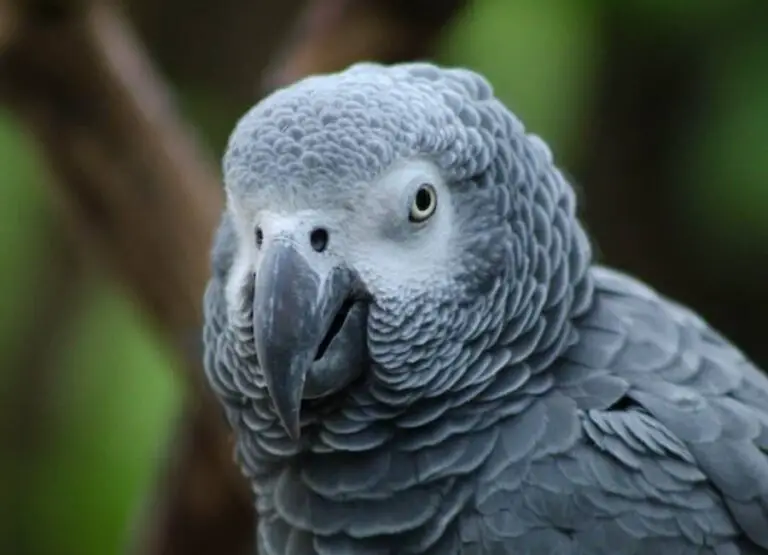
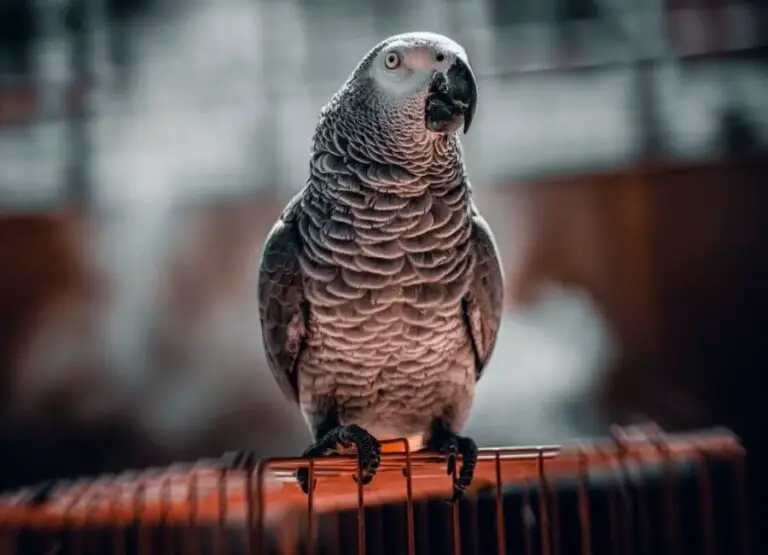
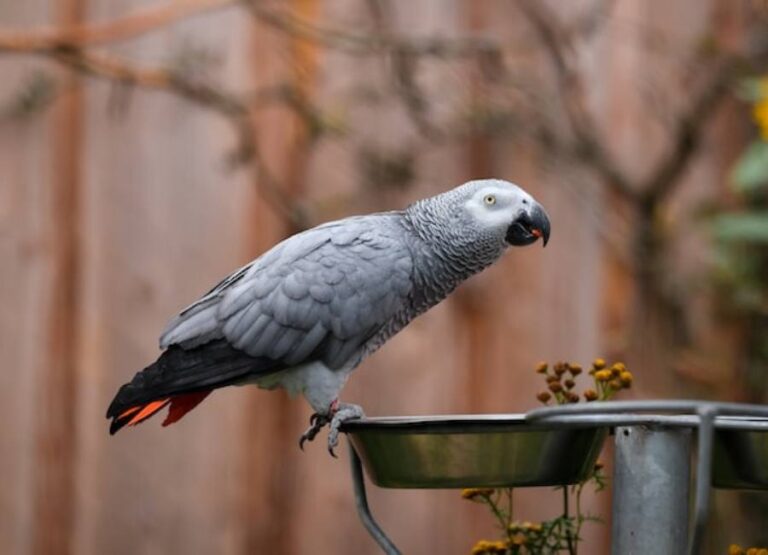
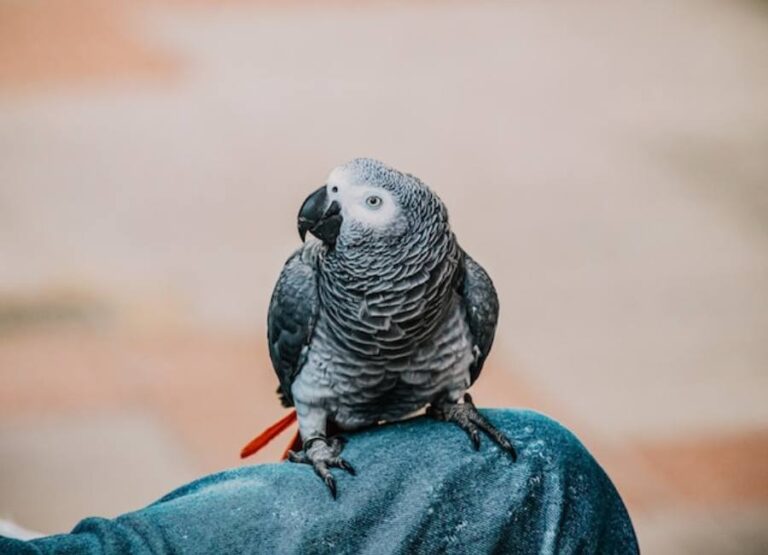
![Why is my African Grey Aggressive [11 Reasons] Why is my African Grey Aggressive](https://petcreeks.com/wp-content/uploads/2023/06/Why-is-my-African-Grey-Aggressive-768x555.jpg)